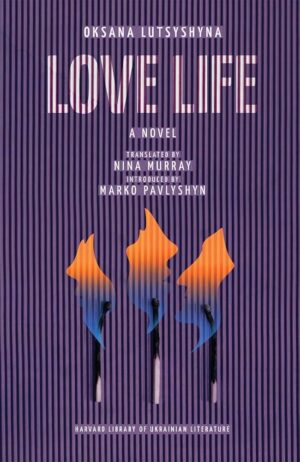Love Life
by Oksana Lutsyshyna, translated by Nina Murray
reviewed by Katy Dycus
Unlike Oksana Lutsyshyna’s previous novel Ivan and Phoebe, which focuses on what it means to be a Ukrainian in Ukraine—and for which Lutsyshyna was awarded the Shevchenko National Prize, Ukraine’s highest literary achievement—Love Life is about being a Ukrainian outside of Ukraine. Yora, an emigrant from Eastern Europe, lives in a place that is clearly meant to be Florida but never explicitly named, where “the Peninsula abruptly emerged from the rain the way a swimmer surfaces to take a breath before diving underwater again.” The rain beats down on you the way life beats down on you. And Yora seems to live underwater, at depths impervious to light or air.
Love Life is also about being a woman in the modern world and the vulnerability accompanying the grief of unbalanced love. Sebastian, a seductive actor who is undeserving of Yora’s unconditional love but still receives it, reveals that Yora is just one of several paramours. Her initial shock and eventual rejection of him lead to the relationship’s demise. Yet Sebastian remains a powerful presence in her life. The breakdown of their relationship has a knock-on effect that leads to the literal breakdown of everything else: the loss of Yora’s job, her finances, her best friend, her self-respect, her health, and nearly her life.
Yora’s grief manifests both psychologically, through bizarre dreams that blur the line between wakefulness and sleep, and physiologically, through a mysterious virus that Yora’s immune system can’t fight. In one of Yora’s dreams, a man signals for Yora to come near, so that he may remove his bandages and show her his wounds. The man turns out to be Job, and his suffering is compared with hers: “Job has no words left anymore, no complaints, everything’s left him, even language itself.” Like Job, Yora’s vice is pride.
Language itself—Lutsyshyna’s most powerful instrument as a translator, novelist, professor, and poet—fails to capture the complexity of how one should act in human relationships. Yora learns that “to be with another means something, it might mean everything, because we have nothing without another. But, at the same time, to be with another means nothing because we exist regardless. It’s like a pair of scissors, with the human body between the blades.” We inevitably get cut; we bear the scars. But, the novel seems to ask, is love worth the pain?
All the women in the novel are victims of patriarchal privilege and power. Lutsyshyna has written and spoken about the harsh and unforgiving nature of the Soviet Union towards femaleness, where the stronger, more privileged, more powerful wins. In Love Life as well as her other work, Lutsyshyna presents women as victims who must steer themselves across a vast cultural and power divide. She invites readers to bear witness to the inheritance of collective trauma: “We in Eastern Europe have few hopes,” Yora tells Sebastian. “We are not taught to expect much.” The phrase applies to gender as much as geography.
Still, readers wonder whether Yora has a role to play in her own sufferings. She refuses to believe Sebastian when he tells her, “There’s no use investing time and effort in something that has already left you.” Yora perpetuates her own suffering by rejecting his advice. She resists her circumstances, romantic and otherwise, with the result that peace eludes her. She cannot love herself and therefore cannot become immune to those who, for whatever reason, may not return her love.
A ray of light breaks through when Yora finally realizes that “love would circle back and embrace those who first fell into its gravitational field; love had always been there. And would always remain.” A force stronger than conscious will and beyond one’s control, love is perhaps unknowable, existing on a separate plane altogether. Best not to crack the enigma, Lutsyshyna suggests.
Published on October 29, 2024

